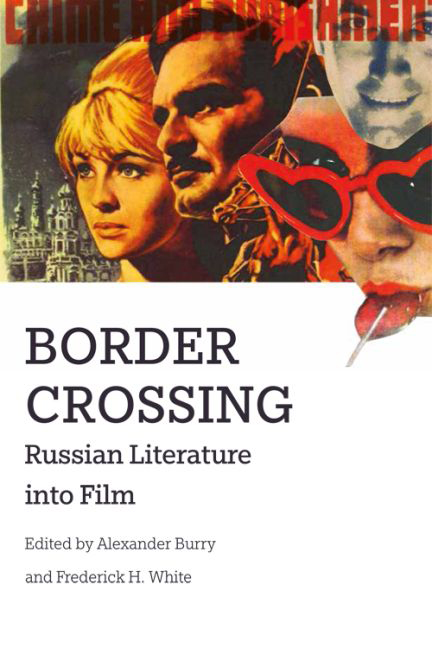Book contents
- Frontmatter
- Contents
- List of Figures
- Notes on the Contributors
- Introduction: Filming Russian Classics—Challenges and Opportunities
- 1 Across the Russian Border
- 2 Dostoevskii's “White Nights”: The Dreamer Goes Abroad
- 3 On Not Showing Dostoevskii's Work: Robert Bresson's Pickpocket
- 4 Stealing the Scene: Crime as Confession in Robert Bresson's Pickpocket
- 5 The Eye-deology of Trauma: Killing Anna Karenina Softly
- 6 “A Vicious Circle”: Karen Shakhnazarov's Ward no. 6
- 7 A Slap in the Face of American Taste: Transporting He Who Gets Slapped to American Audiences
- 8 Against Adaptation? The Strange Case of (Pod) Poruchik Kizhe
- 9 Chasing the Wealth: The Americanization of Il'f and Petrov's The Twelve Chairs
- 10 Fassbinder's Nabokov—From Text to Action: Repressed Homosexuality, Provocative Jewishness, and Anti-German Sentiment
- 11 “The Soviet Abroad (That We Lost)”: The Fate of Vasilii Aksenov's Cult Novel A Starry Ticket on Paper and on Screen
- Conclusion: Passport Control—Departing on a Cinematic Journey
- Bibliography
- Filmography
- Index
9 - Chasing the Wealth: The Americanization of Il'f and Petrov's The Twelve Chairs
- Frontmatter
- Contents
- List of Figures
- Notes on the Contributors
- Introduction: Filming Russian Classics—Challenges and Opportunities
- 1 Across the Russian Border
- 2 Dostoevskii's “White Nights”: The Dreamer Goes Abroad
- 3 On Not Showing Dostoevskii's Work: Robert Bresson's Pickpocket
- 4 Stealing the Scene: Crime as Confession in Robert Bresson's Pickpocket
- 5 The Eye-deology of Trauma: Killing Anna Karenina Softly
- 6 “A Vicious Circle”: Karen Shakhnazarov's Ward no. 6
- 7 A Slap in the Face of American Taste: Transporting He Who Gets Slapped to American Audiences
- 8 Against Adaptation? The Strange Case of (Pod) Poruchik Kizhe
- 9 Chasing the Wealth: The Americanization of Il'f and Petrov's The Twelve Chairs
- 10 Fassbinder's Nabokov—From Text to Action: Repressed Homosexuality, Provocative Jewishness, and Anti-German Sentiment
- 11 “The Soviet Abroad (That We Lost)”: The Fate of Vasilii Aksenov's Cult Novel A Starry Ticket on Paper and on Screen
- Conclusion: Passport Control—Departing on a Cinematic Journey
- Bibliography
- Filmography
- Index
Summary
“Life literally abounds in comedy if you just look around you.”
Mel Brooks“Half is mine, half is ours.”
Ostap Bender“Love is the most important thing in life; riches do not count.”
Mel BrooksThroughout his film career, US comedian, director, and producer Mel Brooks has engaged an amazingly varied assortment of cinematic genres in an irreverent vein: The Producers (1968) is a musical comedy about Adolf Hitler; Blazing Saddles (1974) satirizes the Western; Young Frankenstein (1974) spoofs the horror genre; Silent Movie (1976) takes on the silent film genre, especially its slapstick comedy; and High Anxiety (1977) parodies Hitchcockian suspense films. Through no-holds-barred parody, as well as gags and slapstick humor, Brooks undermines expectations as he lampoons sundry venerable forms institutionalized in American society of the late 1960s and 1970s.
As an outsider Jewish-American comic with ethnic roots in Eastern Europe, Brooks has crafted an identity of considerable appeal to a large, diverse audience over his long career. As the son of first-generation immigrants from the former Russian empire, Brooks had an appreciation and image (however idyllic) of the pre-World War II era of his parents’ generation. In choosing to base his second film on Il'ia Il'f and Evgenii Petrov's 1928 popular Soviet-era novel, The Twelve Chairs, Brooks not only faced the challenge of adapting a book written in a different language about a specific period in a foreign country, but also had to decide how to translate humor and comic situations specific to Soviet society and make them understandable in an American setting. Brooks wisely opted for the generalization of human foibles. The result is a film that focuses on the universal themes of obsessive greed and transnational brotherhood, while also engaging social satire.
This chapter analyzes how Brooks transformed and extrapolated from Il'f and Petrov's plot, character types, humor, and themes, while at the same time stamping the picture with his own brand of humor, personal history, and philosophical outlook.
- Type
- Chapter
- Information
- Border CrossingRussian Literature into Film, pp. 188 - 201Publisher: Edinburgh University PressPrint publication year: 2016

